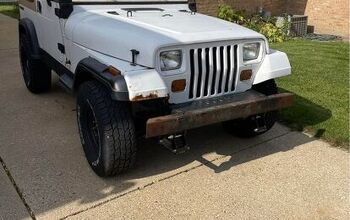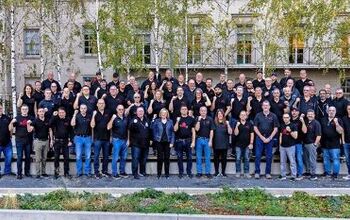Sedans and Missiles: Hyundai Slams Into Another Sales Roadblock

The frustration never seems to end for Hyundai executives. After last year’s Korean labor strife and political scandal, the brand now faces flagging fortunes in the all-important North American market, all thanks to a car-heavy lineup that once guaranteed piles of profit.
Now, the automaker faces the same problem in another global growth engine — China. While that market has also discovered its love for crossovers and SUVs, there’s another problem that Hyundai can’t turn around by rushing a new vehicle to production. Hyundai, it seems, can’t do a damn thing about high-altitude defensive missiles.
Already battered by the Chinese crossover craze — which has seen competitors like General Motors clean up — Hyundai has become a victim of geopolitics.
Anti-Korean sentiment is nothing new to China, but the growing distrust and boycotting of South Korean products — a practice tacitly encouraged by the country’s Communist government — has hit a new high. In response to the nuclear ambitions of North Korea, a key Chinese ally, the South is literally on the defensive. Recently, news emerged that South Korea plans to deploy a U.S.-supplied Terminal High Altitude Area Defense (THAAD) missile battery.
With the first pieces of the missile shield now in place, the system should be fully operational by the end of the year. China isn’t pleased.
According to Bloomberg, Hyundai showrooms in the largest Chinese cities are ghost towns. A manager in a Shanghai dealership told the news agency that weekends will go by without a single person entering the showroom, and that half of his sales staff have already quit.
Reuters reports Hyundai and Kia sales fell a staggering 52 percent in March, year-over-year, as the boycott ramped up. Market share has shrunk to just 3.5 percent. As the automaker counts on China for about a quarter of its overseas sales, the THAAD battery keeping its Seoul headquarters safe from nuclear annihilation won’t save it from that incoming blow. Still, the company persists.
Hyundai plans to offer seven new China-only vehicles, including a gas-powered and electric SUV, to lure Chinese buyers into showrooms. Doing its part, Kia also has a China-only SUV the way.
Beijing Hyundai Motor Company executive Chang Won-shin holds out hopes that anti-Korean sentiment will blow over, telling Bloomberg he expects the business climate to “get better soon.” The company is expected to drop its first-quarter financial report later today, with Kia’s results coming tomorrow.

More by Steph Willems
Latest Car Reviews
Read moreLatest Product Reviews
Read moreRecent Comments
- Kjhkjlhkjhkljh kljhjkhjklhkjh A prelude is a bad idea. There is already Acura with all the weird sport trims. This will not make back it's R&D money.
- Analoggrotto I don't see a red car here, how blazing stupid are you people?
- Redapple2 Love the wheels
- Redapple2 Good luck to them. They used to make great cars. 510. 240Z, Sentra SE-R. Maxima. Frontier.
- Joe65688619 Under Ghosn they went through the same short-term bottom-line thinking that GM did in the 80s/90s, and they have not recovered say, to their heyday in the 50s and 60s in terms of market share and innovation. Poor design decisions (a CVT in their front-wheel drive "4-Door Sports Car", model overlap in a poorly performing segment (they never needed the Altima AND the Maxima...what they needed was one vehicle with different drivetrain, including hybrid, to compete with the Accord/Camry, and decontenting their vehicles: My 2012 QX56 (I know, not a Nissan, but the same holds for the Armada) had power rear windows in the cargo area that could vent, a glass hatch on the back door that could be opened separate from the whole liftgate (in such a tall vehicle, kinda essential if you have it in a garage and want to load the trunk without having to open the garage door to make room for the lift gate), a nice driver's side folding armrest, and a few other quality-of-life details absent from my 2018 QX80. In a competitive market this attention to detai is can be the differentiator that sell cars. Now they are caught in the middle of the market, competing more with Hyundai and Kia and selling discounted vehicles near the same price points, but losing money on them. They invested also invested a lot in niche platforms. The Leaf was one of the first full EVs, but never really evolved. They misjudged the market - luxury EVs are selling, small budget models not so much. Variable compression engines offering little in terms of real-world power or tech, let a lot of complexity that is leading to higher failure rates. Aside from the Z and GT-R (low volume models), not much forced induction (whether your a fan or not, look at what Honda did with the CR-V and Acura RDX - same chassis, slap a turbo on it, make it nicer inside, and now you can sell it as a semi-premium brand with higher markup). That said, I do believe they retain the technical and engineering capability to do far better. About time management realized they need to make smarter investments and understand their markets better.


































Comments
Join the conversation
Something I wasn't aware of until recently: Russia also has a border with North Korea. "Vladimir Putin is sending troops and equipment to Russia's border with North Korea over fears the US is preparing to attack Kim Jong-un. The Russian President fears there will be a huge exodus of North Korean refugees if his American counterpart, Donald Trump, launches military action against Pyongyang." http://www.dailymail.co.uk/news/article-4428384/Putin-sends-troops-Russia-s-border-North-Korea.html
Politics & history . . -Nate